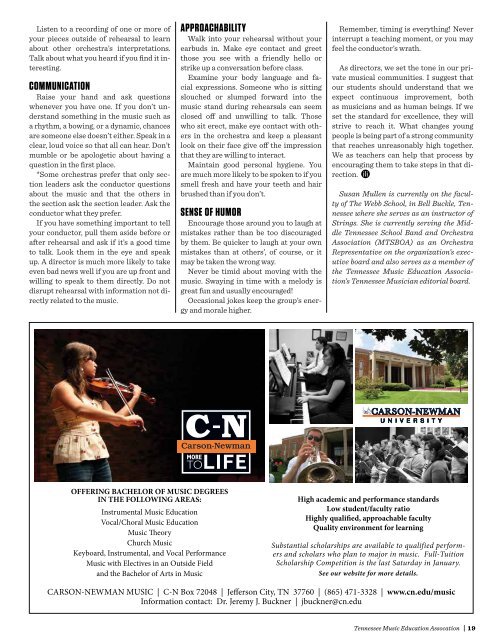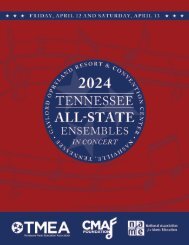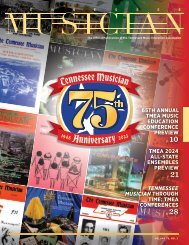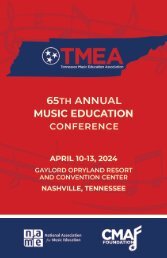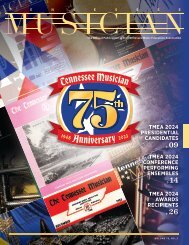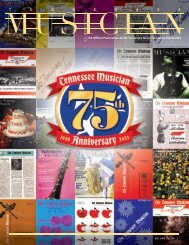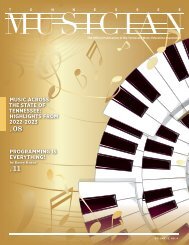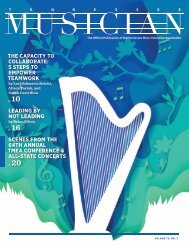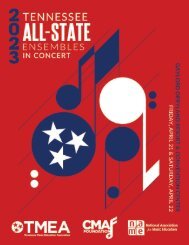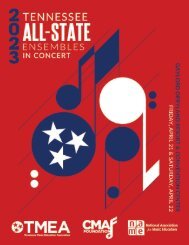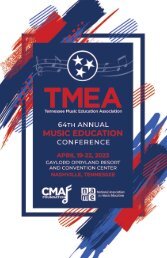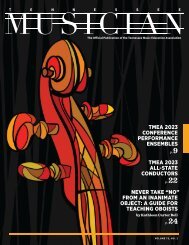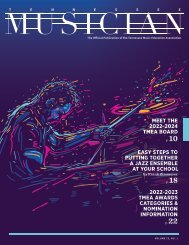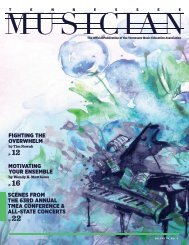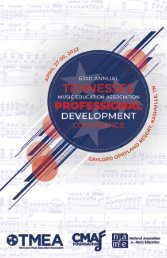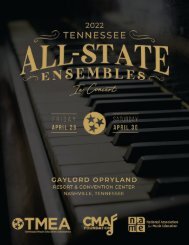You also want an ePaper? Increase the reach of your titles
YUMPU automatically turns print PDFs into web optimized ePapers that Google loves.
Listen to a recording of one or more of<br />
your pieces outside of rehearsal to learn<br />
about other orchestra’s interpretations.<br />
Talk about what you heard if you find it interesting.<br />
COMMUNICATION<br />
Raise your hand and ask questions<br />
whenever you have one. If you don’t understand<br />
something in the music such as<br />
a rhythm, a bowing, or a dynamic, chances<br />
are someone else doesn’t either. Speak in a<br />
clear, loud voice so that all can hear. Don’t<br />
mumble or be apologetic about having a<br />
question in the first place.<br />
*Some orchestras prefer that only section<br />
leaders ask the conductor questions<br />
about the music and that the others in<br />
the section ask the section leader. Ask the<br />
conductor what they prefer.<br />
If you have something important to tell<br />
your conductor, pull them aside before or<br />
after rehearsal and ask if it’s a good time<br />
to talk. Look them in the eye and speak<br />
up. A director is much more likely to take<br />
even bad news well if you are up front and<br />
willing to speak to them directly. Do not<br />
disrupt rehearsal with information not directly<br />
related to the music.<br />
APPROACHABILITY<br />
Walk into your rehearsal without your<br />
earbuds in. Make eye contact and greet<br />
those you see with a friendly hello or<br />
strike up a conversation before class.<br />
Examine your body language and facial<br />
expressions. Someone who is sitting<br />
slouched or slumped forward into the<br />
music stand during rehearsals can seem<br />
closed off and unwilling to talk. Those<br />
who sit erect, make eye contact with others<br />
in the orchestra and keep a pleasant<br />
look on their face give off the impression<br />
that they are willing to interact.<br />
Maintain good personal hygiene. You<br />
are much more likely to be spoken to if you<br />
smell fresh and have your teeth and hair<br />
brushed than if you don’t.<br />
SENSE OF HUMOR<br />
Encourage those around you to laugh at<br />
mistakes rather than be too discouraged<br />
by them. Be quicker to laugh at your own<br />
mistakes than at others’, of course, or it<br />
may be taken the wrong way.<br />
Never be timid about moving with the<br />
music. Swaying in time with a melody is<br />
great fun and usually encouraged!<br />
Occasional jokes keep the group’s energy<br />
and morale higher.<br />
Remember, timing is everything! Never<br />
interrupt a teaching moment, or you may<br />
feel the conductor’s wrath.<br />
As directors, we set the tone in our private<br />
musical communities. I suggest that<br />
our students should understand that we<br />
expect continuous improvement, both<br />
as musicians and as human beings. If we<br />
set the standard for excellence, they will<br />
strive to reach it. What changes young<br />
people is being part of a strong community<br />
that reaches unreasonably high together.<br />
We as teachers can help that process by<br />
encouraging them to take steps in that direction.<br />
Susan Mullen is currently on the faculty<br />
of The Webb School, in Bell Buckle, <strong>Tennessee</strong><br />
where she serves as an instructor of<br />
Strings. She is currently serving the Middle<br />
<strong>Tennessee</strong> School Band and Orchestra<br />
Association (MTSBOA) as an Orchestra<br />
Representative on the organization’s executive<br />
board and also serves as a member of<br />
the <strong>Tennessee</strong> Music Education Association’s<br />
<strong>Tennessee</strong> <strong>Musician</strong> editorial board.<br />
OFFERING BACHELOR OF MUSIC DEGREES<br />
IN THE FOLLOWING AREAS:<br />
Instrumental Music Education<br />
Vocal/Choral Music Education<br />
Music Theory<br />
Church Music<br />
Keyboard, Instrumental, and Vocal Performance<br />
Music with Electives in an Outside Field<br />
and the Bachelor of Arts in Music<br />
High academic and performance standards<br />
Low student/faculty ratio<br />
Highly qualified, approachable faculty<br />
Quality environment for learning<br />
Substantial scholarships are available to qualified performers<br />
and scholars who plan to major in music. Full-Tuition<br />
Scholarship Competition is the last Saturday in January.<br />
See our website for more details.<br />
CARSON-NEWMAN MUSIC | C-N Box 72048 | Jefferson City, TN 37760 | (865) 471-3328 | www.cn.edu/music<br />
Information contact: Dr. Jeremy J. Buckner | jbuckner@cn.edu<br />
<strong>Tennessee</strong> Music Education Assocation | 19


